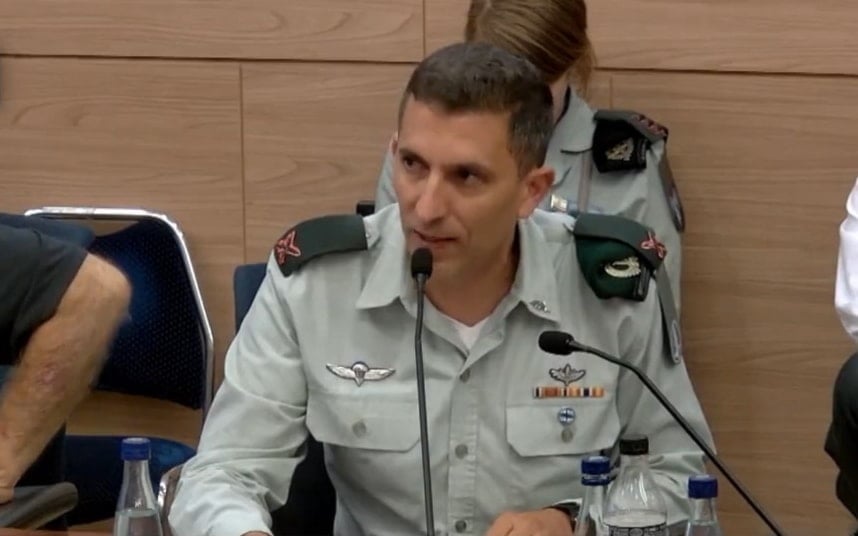Top Israeli Gaza deal negotiator resigns over stalled progress
The Israeli KAN News says Oren Setter played a key role in establishing the current negotiation framework.
-

A screen grab from a video shows Israeli Brigadier General Oren Setter speaking during a Knesset committee meeting on October 20, 2022 (Israeli Knesset Channel)
One of "Israel's" top captive deal negotiators Brigadier General Oren Setter resigned from the negotiation team on Monday, the Israeli KAN News reported.
Serving as deputy to Major General (ret.) Nitzan Alon, Setter played a key role in establishing the current negotiation framework, the media outlet highlighted.
Reports indicate that his resignation stems from frustration over stalled progress in the negotiations aimed at a ceasefire and a prisoner exchange deal with Hamas, KAN News indicated.
It said the Israeli government officials were informed of Setter's decision within the past day.
Analysts suggest that the resignation underscores the persistent lack of meaningful advancement in the negotiations, the report emphasized.
Mossad chief discussed 'unified' Gaza deal proposal in Doha
The announcement came shortly after the office of Israeli occupation Prime Minister Benjamin Netanyahu confirmed that Mossad chief David Barnea has returned from a 24-hour visit to Qatar, where he discussed potential Gaza captive deal proposals.
According to Netanyahu's office, Barnea, alongside CIA Director Bill Burns and Qatari Prime Minister Mohammed bin Abdulrahman Al Thani, reviewed in Doha "a unified proposal" that merges previous approaches while taking into account "the main issues and recent developments in the region."
The "recent developments" likely refer to the killing of Hamas leader Yahya Sinwar in Gaza earlier this month, The Times of Israel suggested.
“In the coming days, the discussions between the mediators and with Hamas will continue to examine the feasibility of talks and continuing to try to promote a deal,” the statement read.
Current proposals include a recent Egyptian plan announced by President Abdel Fattah el-Sisi for a two-day ceasefire in Gaza and the release of four Israeli captives held by the Palestinian Resistance, in addition to a multi-stage Qatari-American initiative aimed at the eventual release of all captives and an end to the ongoing war on the Strip.
Before their resumption, negotiations for a ceasefire in Gaza and a prisoner exchange deal reached a dead end due to Netanyahu's insistence on maintaining Israeli presence along the key Philadelphi Corridor along Gaza's southern border, which also includes the Rafah Crossing with Egypt.
Meanwhile, Hamas has repeatedly reiterated its key demands for any potential agreement; a permanent ceasefire, the complete withdrawal of Israeli occupation forces from the Gaza Strip, the unrestricted return of displaced residents to their homes, comprehensive relief and reconstruction efforts, and a serious prisoner exchange deal.
The Palestinian Resistance group has also demanded that "Israel" adhere to the terms agreed upon on July 2, which are based on a plan laid out by US President Joe Biden and a UN Security Council resolution.
In a statement to Al Mayadeen, senior Hamas official Mahmoud Mardawi articulated the group’s stance on the ongoing negotiations, emphasizing that the Palestinian Resistance's demands for a ceasefire, Israeli withdrawal from Gaza, and humanitarian relief must be acknowledged before discussing the issue of captives.
In response to el-Sisi's two-day ceasefire proposal, Mardawi said, "We demand a comprehensive and clear deal, and we will not accept the fragmentation of the basic document."
He further expressed the group's anticipation of the results from the Doha meeting, indicating that Hamas is awaiting concrete outputs from these discussions.
The Hamas official concluded by asserting that "if the enemy does not announce its approval of the proposal, we will not approve of it in advance."
Read more: Progress in ceasefire talks not expected till post-US election: CNN

 4 Min Read
4 Min Read








